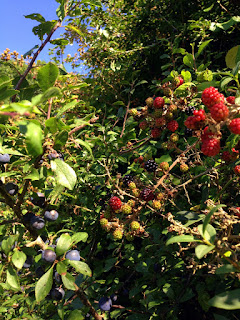I've been fortunate enough to be away from my desk a good deal over the last couple of months. Now I'm back, there are all sorts of things I want to catch up on writing about - but before I do that, I just want to take a little time out to reflect on some of the special places I've been to recently.
I don't mean 'special' simply in the sense of places that are interesting/fascinating/stimulating to visit, because they're beautiful or full of history or whatever. I mean it in the sense of places that soothe you and calm you: and much more than that - that fill you with a sense that, despite all the evidence to the contrary, the world is in balance - that 'all manner of thing shall be well', to steal from Julian of Norwich.
The first two places come from a trip to Canada for a family wedding. We flew from Bristol, with a chirpy new Icelandic company called Wow Air, changing planes at Keflavik, the airport for Reykjavik. Coming in to land, we saw low mountains in the distance, scattered with blue lakes and patches of snow: closer to, the landscape was treeless, almost lunar. As we taxied towards the terminal, we saw swathes of blue flowers that looked from a distance like lupins.
We were all set for the stressiness that usually comes with airports - crowds, miles of corridors, inaudible announcements. But Keflavik wasn't like that at all. As we entered the small building, we saw that our departure gate was just on the other side of the corridor. So we had time to wander around. The shop was full of Icelandic woolly jumpers, scarves, and toys; puffins on pottery, tea towels, and cushions; little trolls and a postbox for letters to Christmas elves. On the walls of the airport were lines from Icelandic poems and sagas. I particularly liked this one, from a Viking poem, the Havamal:
Better weight then wisdom a traveller cannot carry. It was all rather magical, and a world away from Heathrow or Toronto or even Bristol.
But once we were on the next leg of the flight to Toronto, things got even better. I glanced out of the window, expecting to see the Atlantic - and saw this. It was a breathtaking landscape of jagged mountains, broad glaciers, and snow-filled chasms. It was Greenland, and it was glorious.
A little later on, we were over the ocean - but what an ocean! It was liberally scattered with ice floes, some quite large, many tiny: glittering and ethereal.
The next place with a touch of the numinous (can I say that? Of course I can. It's my blog, and I'll say what I want to!) was a small town in Ontario called Paris. A river runs through it, broad and shallow. I think it might just be the friendliest town I've ever visited. We had breakfast overlooking the river: upstream, long freight trains occasionally trundled over a bridge. Birds stood on rocks, sunning themselves. This was the day before the referendum result, and in the sunlight and the peace, all seemed right with the world. (Ah, those were the days!)
 |
| The river a little way out of the town. |
Just two more places. One might seem a bit odd. It's St Pancras Station. I was there last Sunday, to meet my grandson, who was coming to stay with us for a week. His train didn't arrive till late afternoon, so I'd taken advantage of my trip up to London to go to a special exhibition at the British Museum, about Sicily. It was very interesting and I'd enjoyed it, but the museum itself and that part of London were very crowded - a bit stressful for a fool used to a quiet hill in Somerset. So when I got to St Pancras, I sat down just opposite the gates from which Oskar and his father would emerge - and a wave of calm swept over me. There's a piano there, and somehow or other there always seems to be someone passing by who can play it, and play it well. So I sat and listened to the music, and watched people strolling past, breaking into smiles as they met friends and relatives - and it was just lovely. I didn't think to take any pictures, but this may suggest the atmosphere.

There is something very special about St Pancras. There's always a whiff of excitement about it, of possibility; you could do through those doors, and up those stairs, and the train that awaits you will take you direct to Europe, with all its variety, beauty and history. (Yes, yes, politics again...) Yet it's not stressful at all - not like Paddington, for instance. I love it.
My final magical place is at the edge of things, where the sea meets the shore. We've been to several different beaches this week with Oskar, in search of perfect castle-building conditions. When the sea sparkles on the water, the waves spill onto the sound and the seabirds cry - well, it's very heaven.
 |
| Oskar working on a moat system. |
This is at Brean Down, not far from Weston-Super-Mare; the land you can see in the distance is the Welsh coast. (For anyone familiar with my book
The Willow Man, I used Brean Down as the setting for the hunt for Ash, in the last chapter.)
Do share any of your special places - well, unless you want to keep them to yourself!














